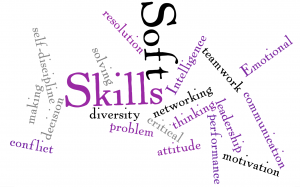 Collaborative competencies are a distinct set of skills that effective alliance professionals have in applying the processes and practices described in the previous blog but collaborative competencies also include many ‘soft skills’. The softskills are ironically the most difficult ones, often gained through on-the-job-training and years of experience. These include being able to assemble virtual, cross functional teams, leading by influence, gaining stakeholder alignment to a common objective and to the means of accomplishing those objectives. People who work within alliance teams also need to be sensitive to the objectives of their partners and be able to resolve conflicts in constructive ways that leverage differences into win/win scenarios. This is the stuff that builds trust and cohesiveness between partners. Change management skills are also key since working with external partners is in itself a change in the way a company does business, introducing new players, new business processes, and a new culture.
Collaborative competencies are a distinct set of skills that effective alliance professionals have in applying the processes and practices described in the previous blog but collaborative competencies also include many ‘soft skills’. The softskills are ironically the most difficult ones, often gained through on-the-job-training and years of experience. These include being able to assemble virtual, cross functional teams, leading by influence, gaining stakeholder alignment to a common objective and to the means of accomplishing those objectives. People who work within alliance teams also need to be sensitive to the objectives of their partners and be able to resolve conflicts in constructive ways that leverage differences into win/win scenarios. This is the stuff that builds trust and cohesiveness between partners. Change management skills are also key since working with external partners is in itself a change in the way a company does business, introducing new players, new business processes, and a new culture.
Lilly, a major pharmaceutical company, adopted a strategy of developing a ‘fully integrated network’ of drug development capabilities. They bet the company on being able to collaborate effectively with partners throughout their value chain in discovering new potential drugs, developing them and commercializing them. As a result they committed to a widespread education and skills development program to ensure that all employees who worked with partners had the opportunity to develop the skills and competency to work within this business model.
Schneider Electric is another company that has recognized the importance of not only adopting proven processes and practices in managing collaboration but also the importance of investing in alliance competency.
“This is a profession not a hobby and requires competent people to ensure success. I have seen in the company where I work, Schneider-Electric, that training our alliance people in alliance management, and then helping them get certified by ASAP has resulted in more successful partnerships. In addition, I have noticed the difference that when we partner with other companies that have invested in alliance management training and certification, we are more successful and can align more quickly.“
Alistair Pim, VP Global Strategic Alliances, Schneider-Electric



